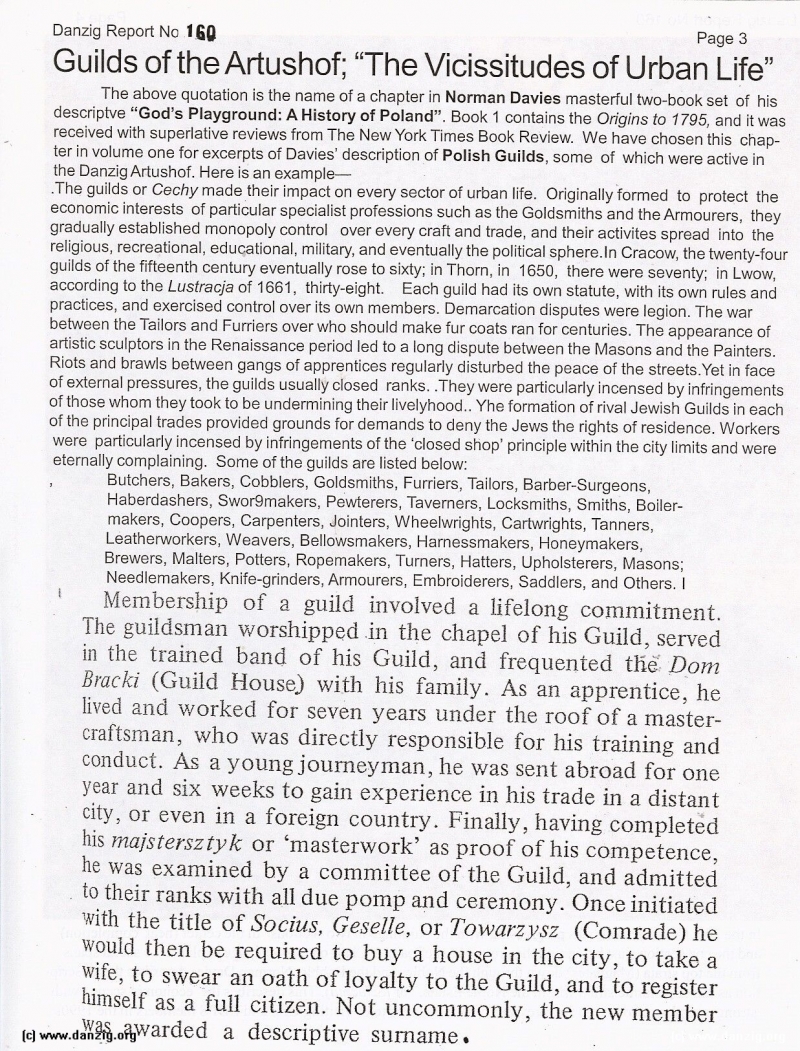
Guilds of the Artushof; “The Vicissitudes of Urban Life”
The above quotation is the name of a chapter in Norman Davies masterful two-book set of his descriptive “God’s Playground: A History of Poland”. Book I contains the Origins to 1795, and it was received with superlative reviews from The New York Times Book Review. We have chosen this chapt er in volume one for excerpts of Davies’ description of Polish Guilds, some of which were active in the Danzig Artushof. Here is an example
The guilds or Cechy made their impact on every sector of urban life. Originally formed to protect the economic interests of particular specialist professions such as the Goldsmiths and the Armourers, they gradually established monopoly control over every craft and trade, and their activites spread into the religious, recreational, educational, military, and eventually the political sphere. ln Cracow, the twenty-four guilds of the fifteenth century eventually rose to sixty; in Thorn, in 1650, there were seventy; in Lwow, according to the Lustracja of 1661, thirty-eight. Each guild had its own statute, with its own rules and practices, and exercised control over its own members. Demarcation disputes were legion. The war between the Tailors and Furriers over who should make fur coats ran for centuries. The appearance of artistic sculptors in the Renaissance period led to a long dispute between the Masons and the Painters. Riots and brawls between gangs of apprentices regularly disturbed the peace of the streets.Yet in face of external pressures, the guilds usually closed ranks. .They were particularly incensed by infringements of those whom they took to be undermining their lively hood. The formation of rival Jewish Guilds in each of the principal trades provided grounds for demands to deny the Jews the rights of residence. Workers were particularly incensed by infringements of the ‘closed shop’ principle within the city limits and were eternally complaining. Some of the guilds are listed below:
Butchers, Bakers, Cobblers, Goldsmiths, Furriers, Tailors, Barber-Surgeons, Haberdashers, Swormakers, Pewterers, Taverners, Locksmiths, Smiths, Boilermakers, Coopers, Carpenters, Jointers, Wheelwrights, Cartwrights, Tanners, Leatherworkers, Weavers, Bellowsmakers, Harnessmakers, Honeymakers, Brewers, Malters, Potters, Ropemakers, Turners, Hatters, Upholsterers, Masons, Needlemakers, Knifegrinders, Armourers, Embroiderers, Saddlers, and Others.
Membership of a guild involved a lifelong commitment. The guildsman worshipped in the chapel of his Guild, served in the trained band of his Guild, and frequented the Dom Bracki (Guild House) with his family. As an apprentice: he lived and worked for seven years under the roof of a master- craftsman, who was directly responsible for his training and conduct. As a young journeyman, he was sent abroad for one year and six weeks to gain experience in his trade in a distant city, or even in a foreign country. Finally, having completed his majstersztyk or ‘masterwork’ as proof of his competence, he was examined by a committee of the Guild, and admitted to their ranks with all due pomp and ceremony. Once initiated with the title of Socius, Geselle, or Towarzysz (Comrade) he Would then be required to buy a house in the city, to take a Wife, to Swear an oath of loyalty to the Guild, and to register himself as a full citizen. Not uncommonly, the new member Was awarded a descriptive surname.
Danzig Report Nr. 160 - 2nd Quarter 2013, Page 3.
Hits: 4103
Added: 13/08/2015
Copyright: 2025 Danzig.org

